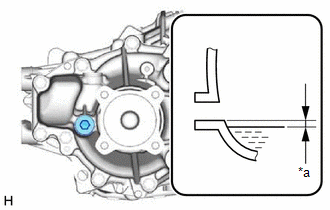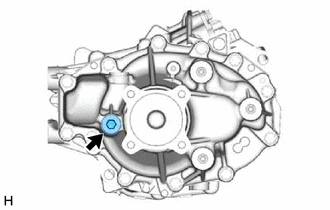Toyota Corolla Cross: On-vehicle Inspection
ON-VEHICLE INSPECTION
PROCEDURE
1. INSPECT HYBRID TRANSAXLE FLUID
|
(a) Using a 10 mm hexagon socket wrench, remove the filler plug and gasket
from the rear traction motor with transaxle assembly.
|
|
|
(b) Check that the hybrid transaxle fluid level is between 0 to 5 mm
(0 to 0.197 in.) from the bottom lip of the filler plug opening.
NOTICE:
- When inspecting the hybrid transaxle fluid, make sure that the vehicle
is level.
- Be sure to directly check that the hybrid transaxle fluid level
is within the specified range.
- Driving the vehicle with an insufficient or excessive amount of
hybrid transaxle fluid may damage the rear traction motor with transaxle
assembly.
- If the hybrid transaxle fluid was replaced or if the hybrid transaxle
fluid was added, make sure to recheck the hybrid transaxle fluid level
after driving the vehicle.
|

|
|
*a
|
0 to 5 mm (0 to 0.197 in.)
|
|
|
(c) Check for leaks if the hybrid transaxle fluid level is low. (If there are
no hybrid transaxle fluid leaks but the hybrid transaxle fluid level is low, add
hybrid transaxle fluid.)
Click here .gif)
(d) Using a 10 mm hexagon socket wrench, install a new gasket and the filler
plug to the rear traction motor with transaxle assembly.
Torque:
50 N·m {510 kgf·cm, 37 ft·lbf}
2. INSPECT FOR HYBRID TRANSAXLE FLUID LEAK
(a) Check for hybrid transaxle fluid leaks.
READ NEXT:
ADJUSTMENT
CAUTION / NOTICE / HINT
NOTICE:
For the hybrid transaxle fluid, use Toyota Genuine e-Transaxle Fluid TE.
Using transmission fluid other than the above type may cause abnormal noise or
Components
COMPONENTS
ILLUSTRATION
*1
DIFFERENTIAL SIDE GEAR SHAFT LH TYPE T OIL SEAL
*2
DIFFERENTIAL SIDE GEAR SHAFT RH TYPE T OIL SEAL
SEE MORE:
DESCRIPTION
DTC No. Detection Item
DTC Detection Condition Trouble Area
Warning Indicate Test Mode / Check Mode
B002013 Left Side Airbag Deployment Control Circuit Open
One of the following conditions is met:
The airbag ECU assembly detects an open in t
DESCRIPTION
When the system is starting up and the skid control ECU (brake
actuator assembly) detects a speed sensor circuit malfunction via the speed sensor
circuit self-diagnosis function, this DTC is stored.
DTC No.
Detection Item
DTC Detection Condition
.gif)




